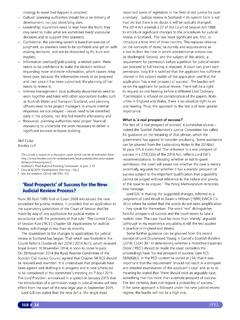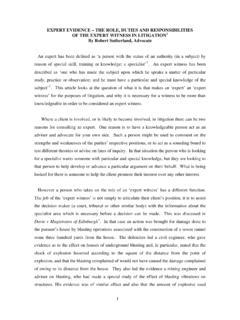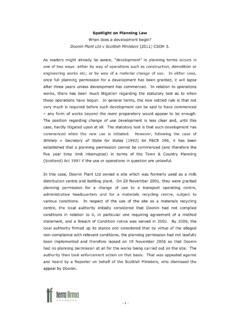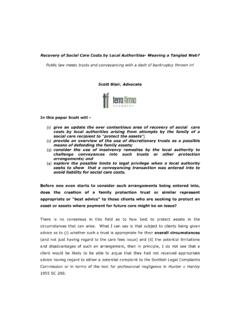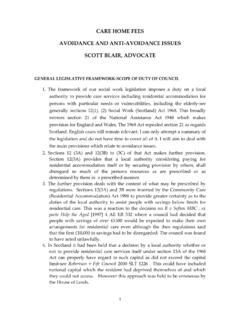Transcription of JUDICIAL REVIEW SCOPE AND GROUNDS - Terra …
1 1 JUDICIAL REVIEW SCOPE AND GROUNDS By Scott Blair, Advocate THE TRIGONOMETRY OF JUDICIAL REVIEW In Scotland, unlike England and Wales, the JUDICIAL REVIEW jurisdiction is not limited to cases which have an element of public law. As explained by Lord President Hope in West v. Secretary of State for Scotland 1992 SC 385 at 413 the SCOPE of JUDICIAL REVIEW is as follows: The following propositions are intended therefore to define the principles by reference to which the competency of all applications to the supervisory jurisdiction under Rule of Court 260B is to be determined: 1. The Court of Session has power, in the exercise of its supervisory jurisdiction, to regulate the process by which decisions are taken by any person or body to whom a jurisdiction, power or authority has been delegated or entrusted by statute, agreement or any other instrument. 2. The sole purpose for which the supervisory jurisdiction may be exercised is to ensure that the person or body does not exceed or abuse that jurisdiction, power or authority or fail to do what the jurisdiction, power or authority requires.
2 3. The competency of the application does not depend upon any distinction between public law and private law, nor is it confined to those cases which English law has accepted as amenable to JUDICIAL REVIEW , nor is it correct in regard to issues about competency to describe JUDICIAL REVIEW under Rule of Court 260B as a public law remedy. By way of explanation we would emphasise these important points: (a) JUDICIAL REVIEW is available, not to provide machinery for an appeal, but to ensure that the decision-maker does not exceed or abuse his powers or fail to perform the duty which has been delegated or entrusted to him. It is not competent for the court to REVIEW the act or decision on its merits, nor may it substitute its own opinion for that of the person or body to whom the matter has been delegated or entrusted. (b) The word "jurisdiction" best describes the nature of the power, duty or authority committed to the person or body which is amenable to the supervisory jurisdiction of the court.
3 It is used here as meaning simply "power to decide", and it can be applied to the acts or decisions of any administrative 2 bodies and persons with similar functions as well as to those of inferior tribunals. An excess or abuse of jurisdiction may involve stepping outside it, or failing to observe its limits, or departing from the rules of natural justice, or a failure to understand the law, or the taking into account of matters which ought not to have been taken into account. The categories of what may amount to an excess or abuse of jurisdiction are not closed, and they are capable of being adapted in accordance with the development of administrative law. (c) There is no substantial difference between English law and Scots law as to the GROUNDS on which the process of decision-making may be open to REVIEW . So reference may be made to English cases in order to determine whether there has been an excess or abuse of the jurisdiction, power or authority or a failure to do what it requires.
4 (d) Contractual rights and obligations, such as those between employer and employee, are not as such amenable to JUDICIAL REVIEW . The cases in which the exercise of the supervisory jurisdiction is appropriate involve a tri-partite relationship, between the person or body to whom the jurisdiction, power or authority has been delegated or entrusted, the person or body by whom it has been delegated or entrusted and the person or persons in respect of or for whose benefit that jurisdiction, power or authority is to be exercised. Over the next few pages an attempt will be made to explain these propositions in a little more detail. Given the approach of the Supreme Court in Eba v. Advocate General for Scotland [2011] UKSC 29; [2011] 3 WLR 149; [2011] PTSR 1095; 2011 SLT 768; [2011] STI 1941 (decided 22 June 2011), the view that the substantive law of JUDICIAL REVIEW in Scotland and in England should be the same has even greater resonance now.
5 Until West was decided, and based on the decision in Tehrani v Argyll and Clyde Health Board 1989 SC 342 we had followed the English case law and had used the public law test to determine if JUDICIAL REVIEW was competent. Tehrani was over-ruled in West. One final point should be made here. As explained by Lord Marnoch in Bell v Fiddes 1996 SLT 51 at 52H, it follows that the supervisory jurisdiction excludes procedures for which specific provision is made under the Rules of Court ( for example reduction in Chapter 53 or suspension in Chapter 60) where the jurisdiction being challenged is not of the kind described in West. So in Saunders, Petr 1999 SC 564, a petition for JUDICIAL REVIEW seeking reduction of a Sheriff Court decree was held to be incompetent because reduction of such decrees was dealt with under RCS r. Clearly for many purposes local authority decision making will fall with the SCOPE of West.
6 It is based on statutory powers which in general involve the exercise of discretion under a statutory provision. Decisions will be based on the general statutory power of an authority to do anything which could facilitate or be conducive or incidental to the carrying out of its functions. In addition an authority exercises particular functions all of which are in principle 3 amenable to JUDICIAL REVIEW such as for example education or planning or social work or in relation to the work of the authority as a police authority or a fire authority. Licensing Boards are clearly amenable to JUDICIAL REVIEW as may be decision making delegated under the Licensing (Scotland) Act 2005 by the Clerk to a Licensing Board. JUDICIAL REVIEW of Licensing Boards under the new Licensing (Scotland) Act 2005 will be competent, and if English experience under their recent and similar licensing law reforms is anything to go by, will be likely to increase as compared with experience under the 1976 Act.
7 Statutory or non-statutory bodies which have links to or of interest to local authorities and which have been held to be subject to JUDICIAL REVIEW include Housing Benefit REVIEW Boards : Macleod v Banff and Buchan HBR 1988 SLT 753 ; the Forestry Commissioners : Kincardine and Deeside DC v Forestry Commissioners 1992 SLT 1180; public broadcasting authorities : Wilson v IBA 1979 SC 351 and Wilson v IBA (No 2) 1988 SLT 276; harbour and airport authorities : Air Ecosse Ltd v CAA 1987 SLT 751 and Peterhead Towage Services Ltd v Peterhead Bay Authority 1992 SLT 594; rail authorities: Highland RC v British Railways Board 1996 SLT 274; the Chief Constable : Thomson v Chief Constable of Grampian Police 2001 SC 443; the internal affairs of political parties : Brown v. Executive Committee of Edinburgh Labour Party 1995 SLT 985; housing associations : Boyle v. Castlemilk East Housing Co-operative Ltd 1995 SLT 56; the Keeper of the Registers of Scotland : Millar & Bryce Ltd v Keeper of the Registers of Scotland 1997 SLT 1000 ; Short s Tr v Keeper of the Registers of Scotland 1994 SC 122 and affirmed 1996 SC ( HL) 14.
8 Of interest to local authorities contemplating JUDICIAL REVIEW proceedings as petitioners are the following. The Scottish Parliament is subject to JUDICIAL REVIEW : Whaley v Lord Watson of Invergowrie 2000 SC 340. There the First Division held that as the Parliament was a creature of statute the Courts, not the Parliament were the ultimate arbiters of the powers of that body. The remedies open to the Court are more limited than the remedies otherwise open to it under r. 58 as result of section 40 of the Scotland Act 1998. The Crown and Ministers of the Crown and Scottish Ministers exercising the common law prerogative powers of the Crown are probably amenable to JUDICIAL REVIEW even although on one view there is no delegation of power in West terms, the Crown being one and indivisible as was held in constitutional law terms in Town Investments Ltd v Department of the Environment [1978] AC 359.
9 If the prerogative powers were not amenable to JUDICIAL REVIEW the result would mean that golf clubs were amenable to JUDICIAL REVIEW (Crocket v Tantallon Golf Club 2005 SLT 663 ) but that important public law decisions by the Crown were not. To hold otherwise would mean that these powers of the Crown in Scotland were not reviewable when there are growing 4 indications in the English case law that such powers are, in a modern constitutional state governed by the Rule of Law, amenable to REVIEW . Thus in R (Bancoult) v Secretary of State for Foreign Commonwealth Affairs [2006] EWHC 1038 (Admin), the Court held that The suggestion that a minister can, through the means of an Order in Council, exile a whole population from a British Overseas Territory and claim that he is doing so for the peace, order and good government of the Territory is, to us, repugnant (para 142).
10 That case related to the removal from the Chagos Islands of the indigenous population. Some 2000 people were moved from the archipelago in the late 1960s and sent to Mauritius and the Seychelles, after the UK government secretly leased Diego Garcia to the US to use as an air base. The base has been used to launch bombing raids in both Iraq and Afghanistan and the Islanders are excluded on the GROUNDS that their presence on the Chagos Islands would represent a security threat to the base - albeit one posed from 150 miles away. Sir Sydney Kentridge QC representing the Islanders argued that the prerogative order in council, made under the royal prerogative but applied with extraterritorial effect was repugnant and ultra vires. The focus was on the constitutional position of such a prerogative power and the fact that there is no precedent for using it to exclude an entire population from a British territory.
